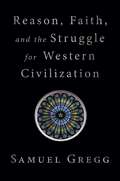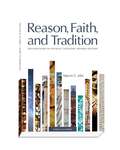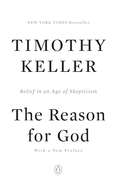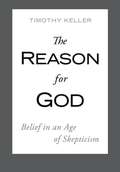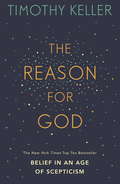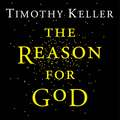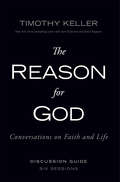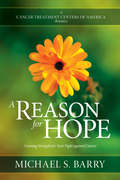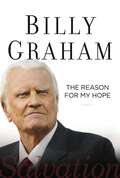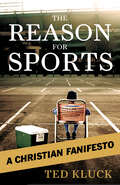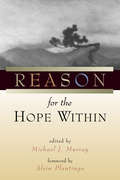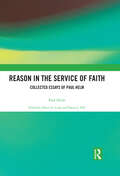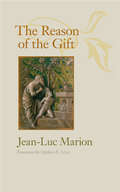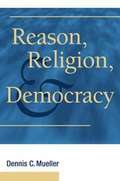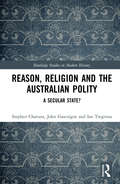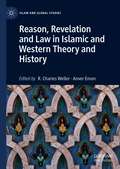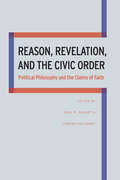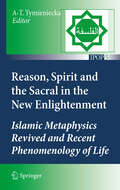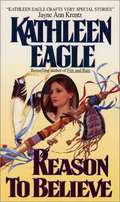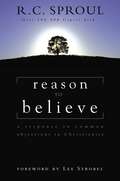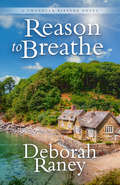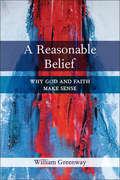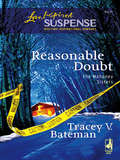- Table View
- List View
Reason, Faith, and the Struggle for Western Civilization
by Samuel Gregg"Gregg's book is the closet thing I've encountered in a long time to a one-volume user's manual for operarting Western Civilization." —The Stream The genius of Western civilization is its unique synthesis of reason and faith. But today that synthesis is under attack—from the East by radical Islam (faith without reason) and from within the West itself by aggressive secularism (reason without faith). The stakes are incalculably high. The naïve and increasingly common assumption that reason and faith are incompatible is simply at odds with the facts of history. The revelation in the Hebrew Scriptures of a reasonable Creator imbued Judaism and Christianity with a conviction that the world is intelligible, leading to the flowering of reason and the invention of science in the West. It was no accident that the Enlightenment took place in the culture formed by the Jewish and Christian faiths. We can all see that faith without reason is benighted at best, fanatical and violent at worst. But too many forget that reason, stripped of faith, is subject to its own pathologies. A supposedly autonomous reason easily sinks into fanaticism, stifling dissent as bigoted and irrational and devouring the humane civilization fostered by the integration of reason and faith. The blood-soaked history of the twentieth century attests to the totalitarian forces unleashed by corrupted reason. But Samuel Gregg does more than lament the intellectual and spiritual ruin caused by the divorce of reason and faith. He shows that each of these foundational principles corrects the other’s excesses and enhances our comprehension of the truth in a continuous renewal of civilization. By recovering this balance, we can avoid a suicidal winner-take-all conflict between reason and faith and a future that will respect neither.
Reason, Faith, and Tradition: Explorations in Catholic Theology (Revised Edition)
by Martin C. AlblIs religious belief reasonable? Specifically, is the doctrine of the Catholic faith consistent with reason? Drawing on Catholic and Christian theological traditions, Martin Albl engages readers in theological thinking on various topics including the Trinity, Christology, ecclesiology, human nature, sin, salvation, revelation, and eschatology. Clear and focused, the text links traditional teaching with contemporary issues to show the relevance of faith to contemporary issues. A glossary, cross-referencing system, text and discussion questions, and footnotes with information about Internet resources provide more in-depth information.
The Reason for God: Belief in an Age of Skepticism
by Timothy KellerA New York Times bestseller people can believe in—by "a pioneer of the new urban Christians" (Christianity Today) and the "C.S. Lewis for the 21st century" (Newsweek). Timothy Keller, the founding pastor of Redeemer Presbyterian Church in New York City, addresses the frequent doubts that skeptics, and even ardent believers, have about religion. Using literature, philosophy, real-life conversations, and potent reasoning, Keller explains how the belief in a Christian God is, in fact, a sound and rational one. To true believers he offers a solid platform on which to stand their ground against the backlash to religion created by the Age of Skepticism. And to skeptics, atheists, and agnostics, he provides a challenging argument for pursuing the reason for God.Look out for Timothy Keller's latest book, The Songs of Jesus. From the Trade Paperback edition.
The Reason for God: Belief in an Age of Skepticism
by Timothy KellerKeller explains how faith in a Christian God is a soundly rational belief, held by thoughtful people of intellectual integrity with a deep compassion for those who truly want to know the truth.
The Reason for God: Belief in an age of scepticism
by Timothy KellerAs the pastor of an inner-city church in New York City, Timothy Keller has compiled a list of the most frequently voiced ‘doubts’ sceptics bring to his church, as well as the most important reasons for faith. In THE REASON FOR GOD, he addresses each doubt and explains each reason.Keller uses literature, philosophy, real-life conversations, and reasoning to explain how faith in a Christian God is a soundly rational belief, held by thoughtful people of intellectual integrity with a deep compassion for those who truly want to know the truth.
The Reason for God: Belief in an age of scepticism
by Timothy KellerAs the pastor of an inner-city church in New York City, Timothy Keller has compiled a list of the most frequently voiced 'doubts' sceptics bring to his church, as well as the most important reasons for faith. In THE REASON FOR GOD, he addresses each doubt and explains each reason. Keller uses literature, philosophy, real-life conversations, and reasoning to explain how faith in a Christian God is a soundly rational belief, held by thoughtful people of intellectual integrity with a deep compassion for those who truly want to know the truth.(P)2008 Penguin Audiobooks
The Reason for God Discussion Guide: Conversations on Faith and Life
by Timothy KellerIn the New York Times bestselling book The Reason for God, Timothy Keller established himself as a modern-day C. S. Lewis who brings together faith and intellect, theology and popular culture, modern-day objections and historic Christian beliefs. Now fans of the book will find resources to help them engage with those same objections, drawing on recent scholarship and debates. The Reason for God video-based Bible study can be used individually, in groups, or by any believer who is engaging with friends who don’t share his or her beliefs. Christians will be challenged to wrestle with their friends and neighbors’ hardest questions, and to engage those questions in ways that will spark an honest, enriching, and humbling dialogue. The Reason for God video captures a live and unscripted conversation between Timothy Keller and six panelists discussing their objections to Christianity. This discussion guide will help small groups and individuals dig deeper into these objections and learn about both sides of the issues. Study Details: Session Titles and Descriptions: 1. Isn’t the Bible a Myth? 2. How Can You Say There Is Only One Way to God? 3. What Gives You the Right to Tell Me How to Live My Life? 4. Why Does God Allow Suffering? 5. Why Is the Church Responsible for So Much Injustice? 6. How Can God Be Full of Love and Wrath at the Same Time? Awards: 2011 Christian Retailers Choice award for Curriculum (Nontraditional) 2011 Outreach Magazine Resources of the Year for Small Group (Curricula)
A Reason For Hope
by Michael S. BarryHope is a strange commodity. When we don't need it, we rarely think about it. But when we need it, we need as much as we can get. So it is for people who are dealing with cancer. As a chaplain for the Cancer Treatment Centers of America, author and pastor Michael S. Barry has an insider's understanding of the cancer patient's need for A Reason for Hope. With warmth and wisdom, he offers the reader scientific evidence and Scriptural principles that fuel the will to live and build the hope that can heal. If you have cancer-or are in a support role to someone who does-here is A Reason for Hope. "A Reason for Hope is one of the most important books on cancer survival available. It is a must-read for cancer patients as well as for the family and friends who support them." - Jerry K. Rose, Cancer Survivor and President, Total Living Network
The Reason for My Hope: Salvation
by Billy GrahamWhat is the most hopeful word in History? For Billy Graham, that word is SALVATION. Salvation from what? From our selfish and self-destructive selves. From the messes we get ourselves into. From the sin that has haunted humanity from the beginning of time and the evil that pulls us down every day. From the cultural deceits that blind us to God's saving message. From the Hell so many don't believe in. If we don't think we need salvation, we're fooling ourselves.If we think we are beyond salvation, we're underestimating God.If we just don't want to think about salvation, we're putting ourselves in eternal peril. At the age of ninety-five Billy Graham proclaims God's Gospel with resolve and deep compassion. It is a message he has been preaching for more than seventy years. And in this book you will sense its urgency, filled with hope for the future. "Believe on the Lord Jesus Christ, and you will be saved" (Acts 16:31) From America's evangelistic elder statesman: Salvation is what we all long for, when we are lost or in danger or have made a mess of our lives. And salvation belongs to us, when we reach out for the only One who can rescue us, Jesus. The saving message of the Gospel is the heartbeat of this preacher and evangelist. Millions around the world have heard Billy Graham proclaim this unchanging truth. He has never forgotten the transformation of his own life, when he first said yes to God's gift of salvation, and he has witnessed multitudes turn their hearts to the God of Hope. The Reason for My Hope: Salvation presents the essence of that transformative message. It is biblical and timeless, and though simple and direct, it is far from easy. There are hard words, prophetic words, directed toward a culture that denies the reality of sin and distracts us from the veracity of Hell. But through its ominous warnings shines a light that cannot be extinguished, a beacon of hope that Jesus came to seek and to save that which was lost. (Luke 19:10).
The Reason For Sports: A Christian Fanifesto
by Ted KluckThere are books on how to worship God with our marriages, our money, and our sex lives. Books on how to &“think biblically&” about movies, television, and the arts. Books on how to vote Christianly and how not to vote Christianly. But there is little thoughtful, Christ-centered writing on the subject that drives most of men&’s banter with each other and consumes the bulk of their free time- Sports.Written in the vein of Rick Reilly (Sports Illustrated), Chuck Klosterman (Spin, Esquire), and David Foster Wallace (A Supposedly Fun Thing I&’ll Never Do Again), The Reason for Sports will both entertain and shed light on some of today&’s most pertinent sports issues (race, drugs, hero worship, and more)- all through a biblical lens.e drowns puppies, or that you should cheer for all American QB Tim Tebow because he etches a Bible verse on his eye-black before every game. I&’ll let you draw your own conclusions about all of these people. But I&’ll invite you to begin formulating your own theology of sports with me.
The Reason For Sports: A Christian Fanifesto
by Ted KluckThere are books on how to worship God with our marriages, our money, and our sex lives. Books on how to &“think biblically&” about movies, television, and the arts. Books on how to vote Christianly and how not to vote Christianly. But there is little thoughtful, Christ-centered writing on the subject that drives most of men&’s banter with each other and consumes the bulk of their free time- Sports.Written in the vein of Rick Reilly (Sports Illustrated), Chuck Klosterman (Spin, Esquire), and David Foster Wallace (A Supposedly Fun Thing I&’ll Never Do Again), The Reason for Sports will both entertain and shed light on some of today&’s most pertinent sports issues (race, drugs, hero worship, and more)- all through a biblical lens.e drowns puppies, or that you should cheer for all American QB Tim Tebow because he etches a Bible verse on his eye-black before every game. I&’ll let you draw your own conclusions about all of these people. But I&’ll invite you to begin formulating your own theology of sports with me.
Reason for the Hope Within
by Michael J. MurrayDuring the last two decades there has been a renaissance in the field of Christian philosophy. Unfortunately, most of this excellent work has not reached general readers. Reason for the Hope Within was produced specifically to make available the best of contemporary Christian philosophy in a clear, accessible—and highly relevant—manner. Fourteen of America's rising Christian philosophers cover many of the traditional themes of Christian apologetics as well as topics of special relevance to today's world:the problem of evilthe possibility of miraclesthe existence of heaven and hellEastern religionsReligion and scienceChristianity and ethicsReason for the Hope Within provides readers with the most up-to-date resources for thinking about and defending the Christian faith. Contributors: Douglas Blount Robin Collins J. A. Cover William C. Davis Scott A. Davison Daniel Howard-Snyder Frances Howard-Snyder Trenton Merricks Caleb Miller Michael J. Murray Timothy O'Connor John O'Leary-Hawthorn Thomas D. Senor W. Christopher Stewart
Reason in the Service of Faith: Collected Essays of Paul Helm
by Paul HelmPaul Helm is a distinguished philosopher, with particular interests in the philosophy of religion. His work covers some of the most important aspects of the field as it has developed in the last thirty years with particular contributions to metaphysics, religious epistemology and philosophical theology. In celebration of Helm’s life’s work, Reason in the Service of Faith brings together a range of his essays which reflect these central concerns of his thought. Over thirty of Helm's selected essays and four unpublished articles are gathered into five parts: Metaphilosophical issues, Action, Change and Personal Identity, Epistemology, God and Creation, Providence and Prayer. The volume is prefaced with a short editorial introduction and ends with an extensive bibliography of Helm’s published works. Demonstrating the important connection between Helm’s theological and philosophical interests across his body of work, this collection is a remarkable resource for scholars of religion, philosophy and theology.
The Reason of the Gift (Richard Lectures)
by Jean-Luc Marion Stephen E. LewisThis book represents a continuation of Jean-Luc Marion's work on givenness as a foundational concept. A former student of Jacques Derrida, Marion is known for his work in seventeenth-century French philosophy, for his theory of "God without being," and for his reformulation of phenomenology. Marion's groundbreaking work on givenness is articulated through attentive readings in a striking array of philosophical texts. The four pieces collected here, based on the fall 2008 Richard Lectures at the University of Virginia, expand upon and go beyond the lines of Marion's previous work and exemplify the intersection of his own constructive brilliance with his talent and rigor as a historian of philosophy. Reengaging philosophers long central to Marion's own work (Husserl, Heidegger, Levinas) and highlighting the significance of lesser-known but decisive influences (Natorp, Rickert, Meinong), these lectures will be valuable to readers interested in the ongoing conversation seeking to bridge the divide between Continental and analytic philosophies, particularly through the exploration of common points of origin. These pieces tackle some of the most pressing debates in contemporary European philosophy and offer students of Marion material to ponder as they seek to further understand his influences. Taken together, these essays form an important volume by a major figure in contemporary philosophy.
Reason, Religion, and Democracy
by Dennis C. MuellerThe rise of religious fundamentalism in different parts of the world in recent years and its association with terrorism has led to renewed interest in the nature of religion and its compatibility with Western institutions. Much of the focus of this new interest has contrasted religion and science as systems of knowledge. This book also emphasizes the difference between religion and science as means for understanding causal relationships, but it focuses much more heavily on the challenge religious extremism poses for liberal democratic institutions. The treatment contains a discussion of human psychology, describes the salient characteristics of all religions, and contrasts religion and science as systems of thought. Historical sketches are used to establish a link between modernity and the use of the human capacity for reasoning to advance human welfare. The book describes the conditions under which democratic institutions can advance human welfare, and the nature of constitutional rights as protectors of individual freedoms. Extremist religions are shown to pose a threat to liberal democracy, a threat that has implications for immigration and education policies and the definition of citizenship.
Reason, Religion and the Australian Polity: A Secular State? (Routledge Studies in Modern History)
by Stephen A. Chavura John Gascoigne Ian TregenzaHow did the concept of the secular state emerge and evolve in Australia and how has it impacted on its institutions? This is the most comprehensive study to date on the relationship between religion and the state in Australian history, focusing on the meaning of political secularity in a society that was from the beginning marked by a high degree of religious plurality. This book tracks the rise and fall of the established Church of England, the transition to plural establishments, the struggle for a public Christian-secular education system, and the eventual separation of church and state throughout the colonies. The study is unique in that it does not restrict its concern with religion to the churches but also examines how religious concepts and ideals infused apparently secular political and social thought and movements making the case that much Australian thought and institution building has had a sacral-secular quality. Social welfare reform, nationalism, and emerging conceptions of citizenship and civilization were heavily influenced by religious ideals, rendering problematic traditional linear narratives of secularisation as the decline of religion. Finally the book considers present day pluralist Australia and new understandings of state secularity in light of massive social changes over recent generations.
Reason, Revelation and Law in Islamic and Western Theory and History (Islam and Global Studies)
by R. Charles Weller Anver M. EmonThis book engages the diverse meanings and interpretations of Islamic and Western law which have affected people and societies across the globe, past and present, in correlation to the epistemological groundings of those meanings and interpretations. The volume takes a distinctively comparative approach, advancing dialogue on crucial transnational and global debates over the history of Western and Islamic approaches to law, politics and society and their relevance for today. It discusses how fundamental concepts are understood and even translated from one historical or political context or one semantic domain to another. The book provides focused studies of key figures and theories in a manageable, accessible format useful for specialized academic courses and research as well as general audiences.
Reason, Revelation, and the Civic Order: Political Philosophy and the Claims of Faith
by Carson HollowayWhile the dominant approaches to the current study of political philosophy are various, with some friendlier to religious belief than others, almost all place constraints on the philosophic and political role of revelation. Mainstream secular political theorists do not entirely disregard religion. But to the extent that they pay attention, their treatment of religious belief is seen more as a political or philosophic problem to be addressed rather than as a positive body of thought from which we might derive important insights about the nature of politics and the truth of the human condition. In a one-of-a-kind collection, DeHart and Holloway bring together leading scholars from various fields, including political science, philosophy, and theology, to challenge the prevailing orthodoxy and to demonstrate the role that religion can and does play in political life. Contributing authors include such important thinkers as Peter Augustine Lawler, Robert C. Koons, J. Budziszewski, Francis J. Beckwith, and James Stoner.
Reason, Spirit and the Sacral in the New Enlightenment
by Anna-Teresa TymienieckaRationality in its various expressions and innumerable applications sustains understanding and our sense of reality. It is traditionally differentiated according to its sources in the soul: in consciousness, in reason, in experience, and in elevation. Such a functional approach, however, leaves us searching for the common foundation harmonizing these rationalities. The perennial quest to resolve the aporias of rationality is finding in contemporary science's focus on origins, on the generative roots of reality, tantalizing hints as to how this may be accomplished. This project is enhanced by the wave of recent phenomenology/ontopoiesis of life, which reveals the workings of the logos at the root of beingness and all rationality, whereby we gaze upon the prospect of a New Enlightenment. In the rays of this vision the revival of the intuitions of classical Islamic metaphysics, particularly intuition of the continuity of beingness in the gradations of life, receive fresh confirmation.
Reason to Believe
by Kathleen EagleYoung lovers from starkly different lives and worlds, Clara and Ben Pipestone came together in passion and in tenderness. But their marriage could not endure deception -- or the betrayals of a tormented, searching soul. And now, though time and pain have torn them apart, they reunite for the sake of their troubled teenaged daughter -- embarking upon a rugged winter journey across sacred land in symbolic remembrance of Ben's Lakota ancestors ... and to reclaim something beautiful but lost -- and as eternal as the stars.
Reason to Believe: A Response to Common Objections to Christianity
by Lee Strobel R. C. SproulDo Christians Have Good Answers for the Really Tough Questions? Dr. R. C. Sproul believes they do. In this unique book, he deals with the most common objections to the truths of the Christian faith, including: * Has science disproved the existence of God? * Will non-Christians who never hear of Christ go to hell? * Is it narrow-minded and bigoted to believe Christ is only one way to God? * Why do people need God when life is going smoothly? * Isn’t Christianity just a crutch for people who can’t handle life’s pressures? * Is heaven real or just “pie in the sky”? * Do Christians have a good answer to evil and suffering? * How does the church explain all its hypocrites? Reason to Believe is no collection of pat answers and proof texts. It addresses each objection in a separate chapter, which includes a special capsule summary that gives the kernel of each argument. This is a superb resource for those in visitation and calling programs, and a must for anyone who wants to do more than scratch the surface of Christian truths.
Reason to Breathe: The Breathing Series (A Chandler Sisters Novel #1)
by Deborah RaneyPhylicia thought life was passing her by, but maybe this was love's plan all along. . .At twenty-nine, Phylicia Chandler put her life on hold to care for her dying mother with her sisters, Joanna and Britt. Now Mom is gone and their father stuns them all by running off with a woman young enough to be their sister. Life is moving forward all around her, but Phylicia feels stuck--until her father's protégé, Quinn Mitchell, presents the sisters with an intriguing business opportunity to purchase a trio of cottages just outside of Langhorne, Missouri. Joanna and Britt are convinced the three of them should launch a vacation rental venture, but Phylicia remains skeptical.To complicate matters, Quinn soon finds himself falling hard for Phylicia. But how can he pursue this beautiful, talented woman twelve years his junior when she's still reeling over her father's hasty engagement to a younger woman? Quinn is determined to give Phylicia her happily-ever-after. But first, he must help her come to terms with her discovery of long-held family secrets and persuade her that true love can transcend their differences.
A Reason to Stay: An Uplifting Inspirational Romance (K-9 Companions #9)
by Deb KastnerCaring for a little boy… Brings him more than he ever imagined Tied down with family and work responsibilities, Sharpe Winslow has always wondered about the world outside his small Colorado town. When newcomer Emma Fitzpatrick finds herself unsure about caring for the brother she never knew about, Sharpe and his rescue pup, Baloo, step in and take the boy under their wing. Sharpe knows he shouldn&’t get close to Emma or Aidan. But maybe they&’ll give him a reason to stay…From Love Inspired: Uplifting stories of faith, forgiveness and hope.K-9 Companions Book 1: Their Unbreakable Bond by Deb KastnerBook 2: Finding Her Way Back by Lisa CarterBook 3: The Veteran's Vow by Jill LynnBook 4: Her Easter Prayer by Lee Tobin McClainBook 5: Earning Her Trust by Brenda MintonBook 6: Guarding His Secret by Jill KemererBook 7: An Unlikely Alliance by Toni ShilohBook 8: The Cowboy's Journey Home by Linda GoodnightBook 9: A Reason to Stay by Deb KastnerBook 10: The Veteran's Holiday Home by Lee Tobin McClainBook 11: An Alaskan Christmas Promise by Belle CalhouneBook 12: A Steadfast Companion by Myra Johnson
A Reasonable Belief
by William Greenway"Insofar as the essence of this philosophical spirituality is continuous with the essence of Christian spirituality, I am able to specify how . . . we can be utterly confident that it is wholly reasonable and good to affirm, give thanks for, live, and testify to faith in God. "--from the preface While it's clear that a lot of people believe in God, whether they should is a matter of loud debate. Since the Enlightenment, and especially in the last 150 years, a consensus has been building in Western philosophy that belief in a transcendent order--and especially in a supreme being--is unreasonable and should be abandoned. The result of this trend has been to delegitimize religious belief, to claim that those who believe do so against scientific evidence and rational thought. In this confident and sensitive book, William Greenway carefully guides the reader through the developments in Western intellectual life that have led us to assume that belief is irrational. He starts by demonstrating that, along with belief in God, modern definitions of human rationality have also rejected free will and moral agency. He then questions the Cartesian assumption that it is our ability to think that makes us most human and most real. Instead, Greenway explains, it is our capacity to be grasped by the lives and needs of others that forms the heart of who we are. From that vantage point we can see that faith is not a choice we make in spite of evidence to the contrary; it is, rather, wholly rational and in keeping with that which makes us most human. Every person who either has faith or is contemplating faith can be assured that belief in God is both reasonable and good. Greenway embraces both contemporary philosophy and science, inviting readers into a more confident experience of their faith.
Reasonable Doubt
by Tracey V. BatemanWhen tragedy separated teen sweethearts Keri Mahoney and Justin Kramer, they promised to reunite someday. Now, fifteen years later, their meeting was bittersweet. After his wife's murder, Justin sought refuge with his twin sons at the childhood cabin in Missouri where he and Keri had first met. But Keri had become a police officer...and Justin might soon be facing a murder charge. Could past wrongs be forgotten and love rekindled as he and Keri joined forces to find the true killer, and prove Justin's innocence beyond a reasonable doubt?
